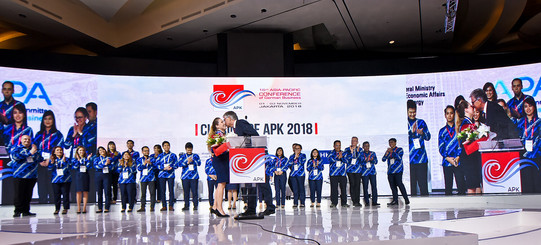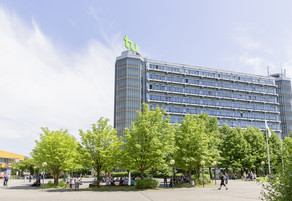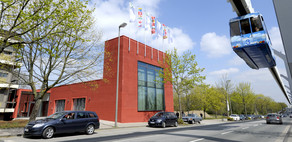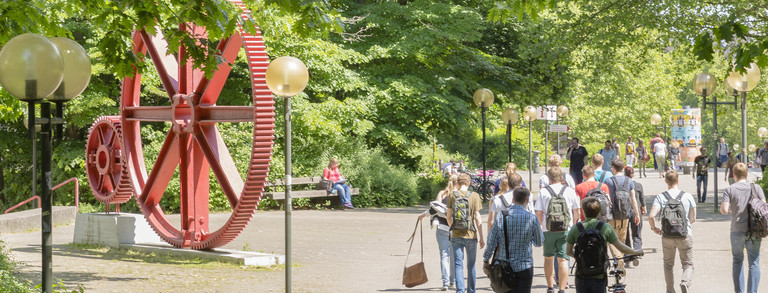"At TU Dortmund University, I learned what teamwork really means"
This interview was conducted by the central Alumni Network. You can find more exciting portraits in this series on the TU Dortmund University alumni page.
Eugenia Rabben studied Applied Linguistics and Engineering at TU Dortmund University from 2009 to 2016 and is now a project manager at Brodos AG. In the interview, she tells us why the unusual combination of subjects was beneficial for her career, why TU Dortmund University is an ideal employer for students, and why she advises students to spend a semester abroad.
Why did you study at TU Dortmund University?
There was, and still is, a very unique combination of subjects at TU Dortmund University, and that appealed to me. When I started looking for a degree program, I was not quite sure what I was going to do, but I knew that I loved languages and absolutely had to do something with languages. At TU Dortmund University, I found the degree program Applied Linguistics, and there were a crazy number of subject combinations. During the orientation week, I decided on engineering as a complementary subject. This is - I think - unique in Germany and is only offered in this form at TU Dortmund University. I have never regretted moving from Emsland to Dortmund for my studies because it really opened up an incredible number of doors for me.
How did your studies shape your life and career?
There were several extremely important aspects which played a role. For one thing, the special combination of subjects made me interesting for employers after graduation. Secondly, there were great part-time jobs at TU Dortmund University. Among other things, I worked for a long time at tu>startup, the startup initiative of TU Dortmund University at that time, from which today's Center for Entrepreneurship and Transfer emerged. I was allowed to take on some great tasks there. While I was really thrown into the deep end at times, I learned a lot as a result.
In addition, the part-time jobs offered by the university were also very easy to combine with my studies. You could earn money and gain experience at the same time. I managed to build up such a large network that one part-time job led to the next, because I was recommended to others.
How did your career progress after graduation?
After graduation, I spent three years living and working in Indonesia's capital, Jakarta. There, in 2018, I organized the 16th Asia-Pacific Conference of German Business as a project manager - the largest German business conference abroad with 1,000 participants. The focus is on the C-level of German business and from Asia-Pacific companies, i.e. CEOs, CFOs and CTOs, as well as high-ranking politicians. In this context, too, my studies clearly helped me, because at university you learn to prioritize and answer the question: What is my task right now and how do I divide the big project into smaller steps? For the organization of this conference, I also benefited from the fact that I learned at TU Dortmund University how important teamwork is and that everyone has to get involved when there is something important to organize - regardless of who has which position in the team.
Today, I am back to working as a project manager, but in the field of telecommunications. I have also started my own business designing pregnancy diaries. Again, I acquired the skills for this during my time at TU Dortmund University: As a student assistant at the startup initiative tu>startup, I had to do a lot in the field of graphic design. In the course of that, I learned a lot on the one hand and realized how much I enjoy it on the other.

What surprised you or was completely unexpected at the beginning of your studies?
I found the biggest difference between school and university to be how much freedom you have at university compared to school. At school, you are told exactly what you have to learn, you have blinders on, so to speak. For me, studying was the time when I really took off all my blinders and got involved with a lot of new things.
Do you have another very special memory of your time at the TU Dortmund University?
Yes, my stay abroad in the USA at Michigan Technological University in Houghton. Some of the friendships last to this day. Even though that was a time I did not spend in Dortmund, it was of course intensively connected to TU Dortmund University. The support from TU Dortmund University was really great. The International Office found the degree program "Scientific and Technical Communication" for me in the USA, which was quite close to what I was already studying in Dortmund. Without the support of the International Office, I would have missed this opportunity because I would never have chosen Michigan Technological University. With this, TU Dortmund University offered me a place where I could not only develop as a person, but also professionally.
Back on campus from the USA - did you have a favorite place here?
Yes, the Sonnendeck (“Sun Deck”, today's food faculty). I loved studying in the library and then incredibly looked forward to having coffee in the Sonnendeck. There, I also always ran into people I knew. So the Sonnendeck was a dream to meet and enjoy.
What do you recommend to today's students?
It is very important to go abroad at least once during your studies, because you will not have this opportunity later on in this way and with this freedom. I am aware that it is not always that easy financially, but there is help available - and at TU Dortmund University you pay the semester contribution and then study on a place abroad, which usually costs €10,000-20,000. And I recommend being open to whatever comes along and taking completely different paths than you thought. By the way, this does not just apply to a stay abroad, but to your entire studies.
Thank you very much for the interview!
You Might also be Interested in:
Back to "Alumni International"
Find more information about TU Dortmund University's Alumni Network
More testimonials from international students:
- Yu Kawahara from Brazil
- Sina Sharif Mansouri from Iran
- Sendhil Raja from India
- Lara from Brazil
- Loran from Indonesia

![Eat & Read [Translate to English:]](/storages/international/r/Bilder/Veranstaltungen/Eat___Read/waffel_plain_buecherturm.jpg)










![[Translate to English:] [Translate to English:]](/storages/international/_processed_/a/8/csm_Alumni_Rabben1_2003b126c0.jpg)